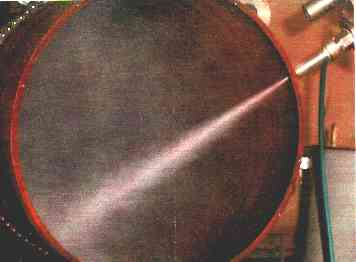Moscow scientists develop water-scalpel to extract explosive from outdated nuclear reactors
Scientists suggest using water and abrasive additives to cut steal

Scientists have been dwelling upon the question of how to cut a worn-out nuclear reactor or a nuke, if there was still some explosive left in it. A flame or a laser will not be good for the purpose – the nuclear content will warm up and explode. A highly-pressured squirt of water saturated with frozen water drops will be a good device to accomplish the goal, scientists from the Tula State University believe.
It is rather hard to create the installation, though: the object is rather dangerous. A wrong movement will inevitably result in an explosion. A squirt of water must be powerful enough to be able to cut metal and wash the nuclear content out without provoking a blast. The remote-controlled system is supposed to be ecologically safe, fast, efficient and economical.
”At first we need to conduct a theoretical research. One has to analyze processes, which take place in a nuclear head, for instance, when it is affected with a compressed squirt of water in order to find out the reaction of the explosive to the water impact,” doctor of technical sciences, Vladimir Brenner said. “If we use the current of ice granules flying at a very high speed, we need to find out the model, according to which they will be formed in the system. One has to find out how the flow of compressed air, water and cooling substances can be transformed into a squirt of tiny ice pieces. When we know how an abrasive material interacts with explosive, it will be possible to conduct experiments and make the actual system,” the professor said.
It is an open secret that one may add an abradant – tiny pieces of solid material – to a squirt of water to considerably increase its power. Russian scientists have already developed and tested such a system. A squirt of water and abrasive powder cut a three-millimeter metal sheet and a six-millimeter steel angle bar. The device proved to be very efficient: the system was cutting metal at the speed of 0.5-3.2 mm per second.
The test system was made to demonstrate potential opportunities of the method, which could be subsequently used for cutting nuclear reactors and warheads. Russian scientists are sure that they will be able to develop compact mobile systems, which will be capable of putting out water squirts with surface pressure of tens of thousands of atmospheres.
Subscribe to Pravda.Ru Telegram channel, Facebook, RSS!





